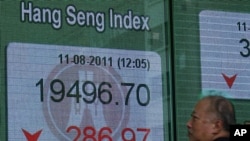Despite robust economic growth in many parts of Asia, stock markets in the region this week have closely followed the sharp swings in stock prices in the United States and Europe.
In the last week, Asian stock prices followed the trend set by stock markets in the United States and Europe, falling from Friday to Tuesday on eurozone fears and the U.S. debt downgrade, rebounding Wednesday after the United States said it would hold rates at record lows for two years. On Thursday, Asian markets initially dropped sharply, but ended the day less than one percent down. At one point on Thursday, gold surged to a record high of more than $1,800 an ounce.
Economist Cyn Young Park, with the Asian Development Bank in Manila, says these are uncertain times for Asian investors as well those in the West. News of U.S. credit rating downgrade highlighted their concerns about the sluggish economies in their primary export markets. She says the volatile swing in stock prices in Asia and an increased demand for gold are temporary moves by investors to play it safe, for now.
"This is really more like a psychological [shock] and then a panic," said Park. "And, if they are not able to contain this, that really can create more problems for the real economies. But at this stage we still need to wait and see whether this sort of a financial turmoil will translate into something more real."
She says Asian stock markets are accurately reflecting concern about the economic health of the region. Although many investors and economic officials in Asia have said the growth of the middle class and trade within the region are making Asia less dependent on the G3 economies of the United States, Europe and Japan, Park says Asia is not yet economically insulated.
"Despite really strong growth in the inter-regional trade, the final demand still lies with the Atlantic economies, the G3 economies," said Park. "With the G3 economies all sort of going through this severe, you know, crisis of confidence and then don't really know whether or not that it is going to affect heavily on their real economy, investors ought to be a little jittery."
Park says a lack of global demand should also ease concerns about severe inflation in China and other countries in the region. The Asian Development Bank is urging central banks in Asia to pause measures to contain high inflation until global market turmoil subsidies.
Asian Markets Follow Sharp US Swings
- By Brian Padden





